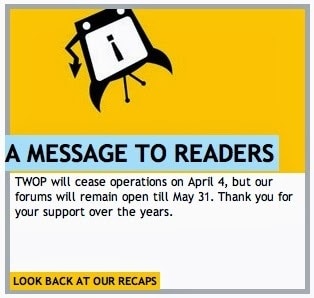by Keidra Chaney

TWoP’s Legacy
The influence of Television Without Pity is notable as a both a pop culture website and a catalyst and birthplace for many of pop culture fandom norms we see in social media and on blogs. The website launched the careers of numerous careers of pop culture critics, most notably NPR’s Linda Holmes. It could be argued that the long-form TV episode recap online writing format was popularized, if not originated, by Television Without Pity, all the way back to its Dawson’s Wrap/Mighty Big TV days in the late 90’s. For many TWoP fans – and detractors – the true legacy of the website is its forums. They were the birthplace of numerous online fan communities and one of the first online spaces where a fandom’s collective voice was heard – and sometimes engaged – by a TV showrunner. Aaron Sorkin’s well-documented passive-aggressive relationship with social technology and online culture was born in his relationship with West Wing fans on TWoP, so you could say it indirectly inspired his Oscar-winning film The Social Network. The forums were the birthplace of at least one fan con – for the at-one-time mega popular The Amazing Race, and is arguably the starting point for a whole host of online fandom references and in-jokes.
The website’s 2007 purchase by Bravo was both a win and a great loss for fandom – a sign that online fandom and pop culture writing was influential and valuable enough to attract the funding of a major media company, but also a large step towards the now-standard fan/brand synergy that has slowly eroded many grassroots fan communities.
Saying goodbye to more than a website
So here we are, in 2014, saying goodbye to TWoP (though, yes, many of us did years ago, and maybe not on the best of terms) but the biggest goodbye, is to what TWoP represents, or did represent at one point: pre-social media online fandom, a time where one’s online fandom could exist in comfortable anonymity, before “social TV” became a career focus, before armchair media criticism became a socially acceptable hobby in the same way fantasy football is.
With the shuttering of the website, we lose a searchable piece of online fandom’s multifaceted history. This history may be written one day, but much of what is written and shared will be from the perspective of the (post-2007) website, and more specifically from the perspective of NBC/Universal, rather than from the fandom activity that it inspired. We can already see it in “formal” online documents such as Wikipedia; TWoP’s entry has a fleeting reference of the website’s 2007 life (including the older fan forums) and little mention of its former writers/creators.
There are two issues at play here: Firstly, as online fandom becomes a business model, we see more and more of its formal history being written and controlled by media owners, which risks having the major players in fandom be written out. Secondly, we’re well beyond the point in the history of online culture where archiving of shuttered and discontinued online properties (especially message boards and blog content) should be a concern for creators and owners. Many influential pre-social media online entities are going dark, and there’s been little discussion of where this information may be archived where it may be of use to the public. (Or if it should be archived, or who should have the responsibility/access to this content)
We’re in the age where content is supposedly king, and provides the fuel that runs the engine of media and tech companies, but what of the history and legacy of this content. It’s not too early to start having these conversations, and to think about how we as professional and fan creators can insure that we maintain at the very least some level of access to the online history we’ve helped to create.

